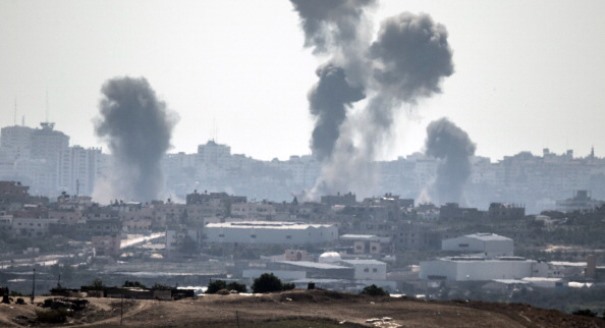A new cycle of violence between Israel and Palestine has begun. What triggered it was the kidnapping and murder of three Israeli youths, allegedly by Hamas, followed by the revenge killing (by burning alive) of a Palestinian teenager by radical Israelis.
Israel inflicted a collective punishment on Palestinians in the West Bank. Homes were demolished, people were prevented from going to work in Jerusalem, and hundreds of young men were detained and put into prison.
Hamas, the radical Islamist movement that runs the Gaza Strip, retaliated by firing rockets into Israel. Israel managed to intercept most of them and at the same time launched a fierce and sustained attack on Gaza. Some 170 people have already been killed and over 1,000 injured, according to the Gaza health ministry.
As for Palestinian leader Mahmoud Abbas, he is as powerless and spineless as ever—refusing to find and arrest those who killed the three Israeli teenagers, while Israel quickly detained those who killed the Palestinian youth.
What makes this latest cycle of violence particularly depressing is that the West just doesn’t seem to care. The United States has all but walked away from the conflict. U.S. President Barack Obama has shown no leadership or courage in dealing with either side. His indifference toward the Middle East is next to irresponsible.
U.S. Secretary of State John Kerry, who failed in his nine-month-long attempt to reach a peace deal between Israel and the Palestinians, has washed his hands of the conflict, too.
As for the European Union, its foreign policy chief Catherine Ashton is focused on reaching a deal with Iran over its nuclear program and continuing the normalization of relations between Serbia and Kosovo. These are important dossiers. But the EU is also a major donor to Palestine, and Israel’s most important trading partner. It cannot turn its eyes away from what is happening in the West Bank and Gaza.
Washington put out feelers to Egypt to mediate, as it used to do under former president Hosni Mubarak. But Egypt’s recently elected President Abdel Fattah el-Sisi, who has cracked down on his country’s Muslim Brotherhood, another Islamist movement, carries no influence with the Hamas leadership. Sisi closed the border and the tunnels between the Gaza Strip and Egypt, cutting off Gaza’s last escape route to the outside world.
Escape is the appropriate word, because Gaza is a prison. Its 1.8 million inhabitants are at the mercy of Israel’s bombardments. It is hard to imagine the conditions in Gaza’s hospitals, which were short of essential medicines and equipment even before the latest conflagration.
The Israeli bombing is certain to contribute to the breeding of a new and radicalized generation of Palestinians who are growing up to hate Israel because it is robbing them of their lives. And because the West and Egypt aren’t even trying to extinguish this latest flare-up, Netanyahu must believe he has a free hand to bombard Gaza at will.
“No international pressure will prevent us from operating with full force against a terrorist organization that calls for our destruction,” Netanyahu said on July 11 during a news conference at the Israeli Defense Ministry in Tel Aviv.
But EU and national European leaders have a political and moral responsibility to act. Anodyne statements of regret and calls for a ceasefire leave the EU just as toothless as the UN Security Council proved when it held an ineffectual emergency session on July 11.
What European leaders and officials should do is go to the Gaza Strip, to Tel Aviv, and to Ramallah and Hebron in the West Bank and see for themselves what is taking place on the ground. That would signal to Netanyahu that the outside world is not indifferent. The fact that Frank-Walter Steinmeier, Germany’s indefatigable foreign minister, is going to the region is a start.
The Europeans should also mobilize massive medical assistance for the people of Gaza. Israel may well try to prevent trucks carrying medicines from entering Gaza, citing security reasons. But the Europeans must demonstrate that they do not condone this relentless suffering of civilians.
The wounded should be taken out of Gaza and given treatment on medical ships or in European hospitals. On this, the Europeans should stand firm. This is a valid humanitarian act even though European governments have failed to extend any such help to the millions injured or made homeless by the Syrian civil war.
On the political front, the EU should tell Abbas to find and arrest the murderers of the three Israeli students. The EU is on the ground in Ramallah, where it has had a police training mission since 2006. It’s not the Europeans’ job to find the murderers, but it is certainly has been their job to build up some judicial structures.
In Israel, people are frightened by the ever greater number of missiles fired at them from Gaza. But the greater injury is the one that the conflict inflicts on the very fabric of society.
The collective punishment that Israel is exacting on the Palestinians is having a terrible corrosive effect on the basic values of dignity, respect, and human rights. In Palestine, the conflict is prolonging the reign of an inept and self-perpetuating leadership. Against such a miserable background, the least the Europeans can do is not to turn away from the people of Gaza.






.jpg)